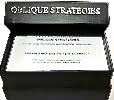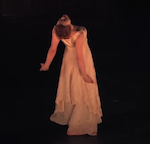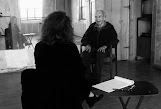first published in
STEPHEN PETRONIO with Nancy Dalva
Stephen Petronio
Confessions of a Motion Addict
(Createspace, 2014)
Stephen Petronio—iconoclastic and
iconic, subversive, game changing, elegant, with just a gleam of
something slightly depraved glinting off his spiky ear studs—is
celebrating 30 years as a choreographer with a debut as an author. Here,
he discusses it all with his new reader but longtime watcher, the Rail’s Nancy Dalva. Confessions of a Motion Addict
(Createspace, 2014)
Nancy Dalva (Rail): What do we learn about you in this book that we don’t learn from your dances?
Stephen Petronio: I wrote Confessions of a Motion Addict as text about my life and the forces that move me into action, both in the world and on the stage. While there is succinct discussion of my creative motor, dance works, and the collaborators I’ve worked with over the years, I wanted very much to verbally construct the back-story of my life.
It was important for me to create and perform with words: to paint my childhood and ascent into the New York dance/art worlds and the touring life that has been so key to who I am. So much of my dance is about the sound and force of motion, and Confessions is about the sound force rhythm of language.
I write quite a bit about the pleasures of the body (i.e. sex), that magic that is so outside of the dance realm. I suppose I thought it was important to track the stories in my body, repurposed for sensual, aesthetic, and spiritual interest. I also write frankly about substance (booze and drugs) use and abuse in Confessions. I thought it was important to parallel my interest in the extremity of these experiences and how they may or may not relate to my art making.
And you get a healthy taste of the crazy Italian family that I came from and how it impacted my social and professional needs.
Rail: I feel as if you have taken the same material and channeled it into two forms of performance art: one is choreography, the other is autobiography. Which one is more veiled? I am thinking here about the “truth.” Autobiography, in general, is seemingly so truthy, yet is a form rife with displacement, projection, selection, delusion, revision, and every other complexity arising from self-reportage.
Petronio: If you have the eyes to do so, you can see straight into my soul when you watch a dance of mine. They are always constructions wrought from mind, body, and taste—my taste, fueled by my desire.


















